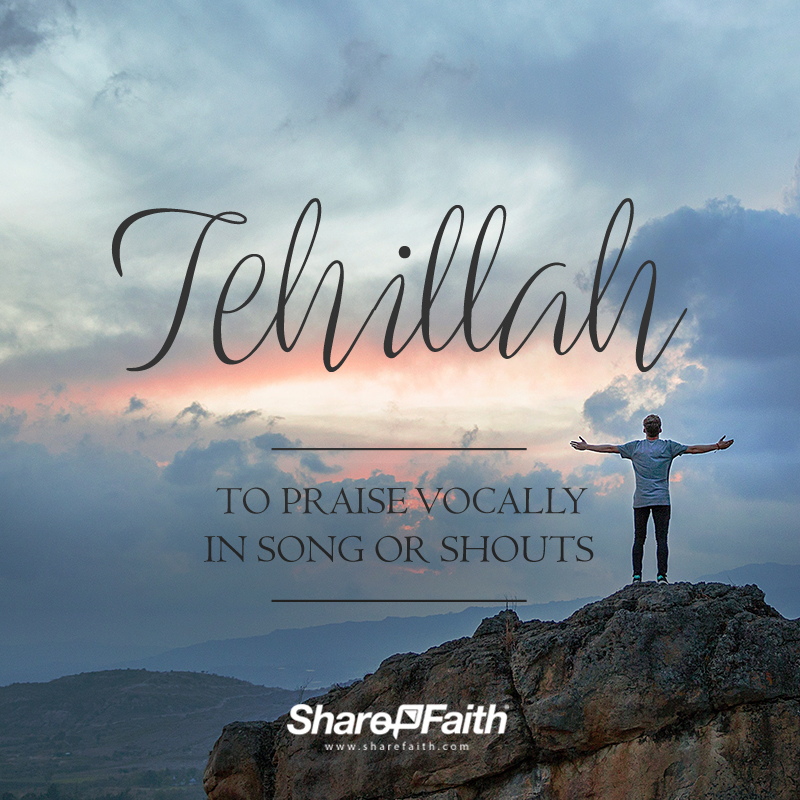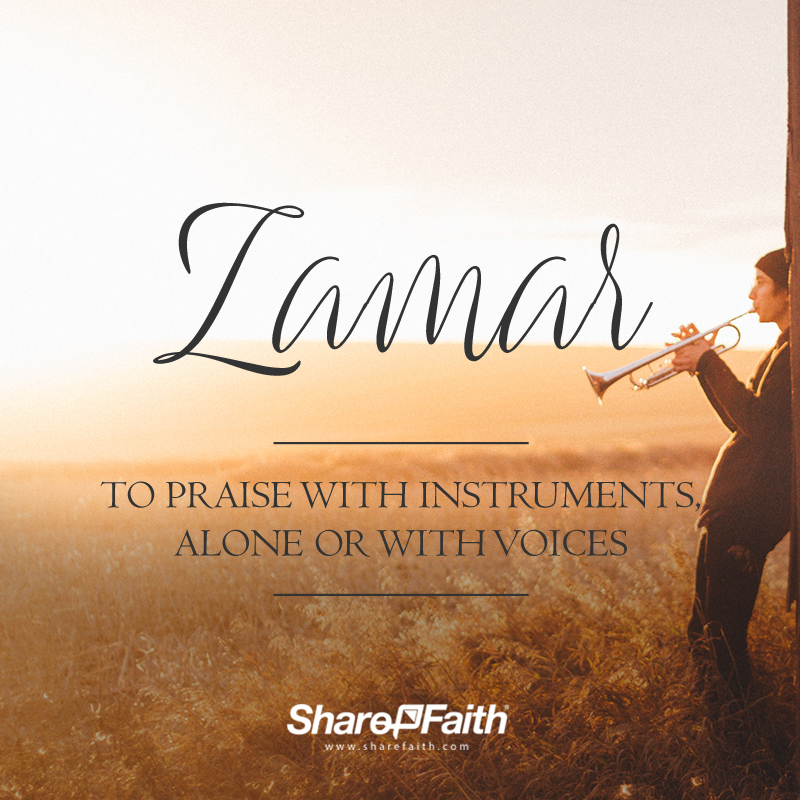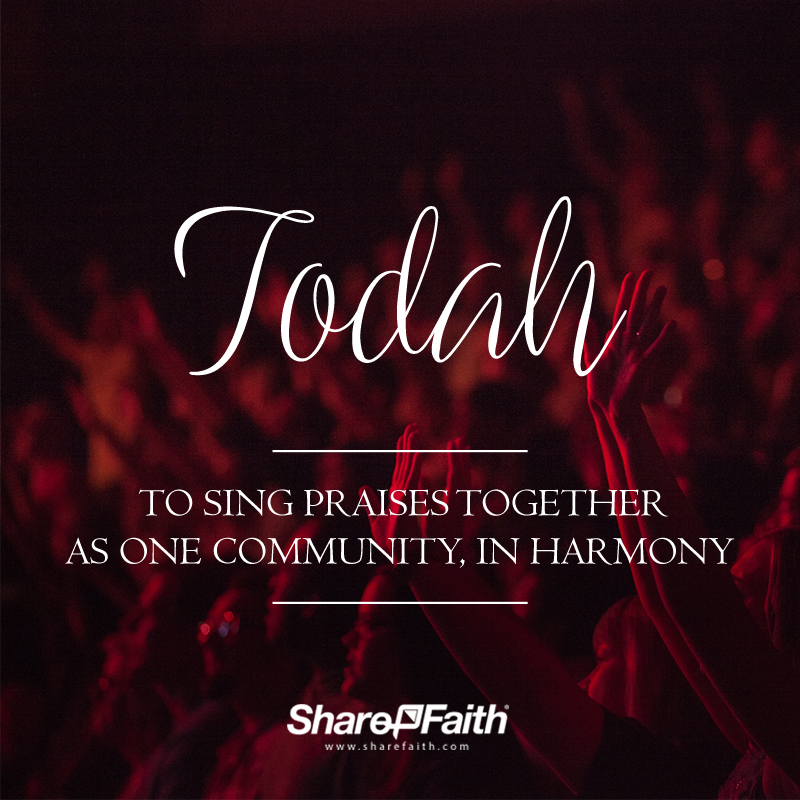Did you know that we get words for “praise” and “worship” from a list of dozens of words? For instance, praise is something that is loud and visible. So, when we think of what volume music should be at church, we can actually use a word from the Bible to explain what that looks like. In other words, the word “hallelujah” means you are loud and perhaps even a bit boisterous. For some, this is what you would hope it means. For others, maybe you are intrigued by the idea of how ancient words in the Scripture can renew our worship today. It just might transform your church’s worship if they only knew how the Bible in its own words and culture explains worship.
The 7 Hebrew Words For Praise In The Bible
I was a twenty-something worship leader at my first full-time position. This growing, 1,000 member church was pastored by an amazing scholar at the time. Dr. Porter earned his two advanced degrees from MIT. This scientist, chemical engineer, and businessman retired early to plant a church in the heart of the brain trust of nuclear research in the East San Francisco Bay Area. Our parishioners were served well by a pastor who could speak in scientific, academic, and business terms. The two areas that Dr. Porter soared in was apologetics and worship. He could preach a sermon using gluons as a metaphor for how God holds things together–yet, literally! And, he spent years as a lay-consultant in the Plymouth Brethren movement teaching churches to transform their worship to reach the current generation radically.
The years in Pleasanton, California were some of my favorite ministry memories. One of these is when I decided to use a book given to me by another pastor entitled, The Hallelujah Factor by author Jack Taylor. In Taylor’s book, I learned some Hebrew and Greek root words that define our praise and worship to God. On one Sunday, I decided to start to open a song with the explanation of the word “hallelujah” and the response blew me away. Our English language at time is unable to give the full color of an almost overused word as “hallelujah.” Pastor Porter was enthused as he valued the teaching component and the help it gave to our worshippers. He asked me to preach a sermon after this and reading something I wrote about the Psalms. The honor of sharing the pulpit with Dr. Porter is a memory I’ll never forget. But, more importantly the explanation of the words in original Hebrew for praise and worship moved the ball forward in our worship expression. People now knew we were not asking them to mimic what another tradition in Christendom does by culture. We were helping them engage in the emotions and colors of the ancient language of our sacred texts in the Old Testament.
As worship leaders, the more we model what we do within the framework of what the Bible clearly explains worship to look like the more often our leadership thrives. With trends in music style in a constant flux and with worshiping in a growing multicultural context, what is it that transcends our momentary strategy? Yes, we want to speak the language of our people and community so their worship expression is authentic. But, do we know what we are translating? Are we aware of the meanings of what we are singing? What are the freedoms we have to express praise and worship? The Book of Psalms and other areas of Scripture teach us that we may be using a rather limited vocabulary to describe what we do each Sunday morning. What I hope to do, is offer my fellow worship leaders and worshipers an expanded language to enrich your heartfelt expression of praise and of worship. Also, knowing this language enhances not only our corporate gathering, but it may also inspire our personal and private expressions as well.
In this primer of Hebrew worship and praise language, we are going to focus on seven ones used more often then others. It will be likely that your favorite Psalm will contain some of this vocabulary. Remember, there are many more words. These just happen to be the most used and are a great place to begin rethinking our description and expression of worship. I have to mention one point of modern history on the topic of “worship” so we are all on the same page. You see, worship is an extremely broad term that has come to mean any and all actions and intentions. So, when we talk about what we do on a Sunday gathering the conclusion over recent times is to put that event as just another worship activity in a life of worship. What we miss in this idea is that worship as individuals is indeed our call for eternity. However, we are part of the Body of Christ and our worship is judged more in that context than we give credit to in our conversations. We come to church as individuals when we really should be coming as a part of a family! We miss the language of Scripture if we apply things as personal which are meant to be corporate.
Another important point then to make is that the word “praise” has lost favor when discussion our corporate worship gatherings. We use a generic version of the word “worship” to house praise that is done together with the church as well as our own personal devotional life. This creates a problem when we as worship leaders hold a title that then cannot be narrowly defined! So, the word praise is mentioned in the Scripture hundreds of times, giving us momentum to flow into this activity of jubilant, expressive, and joyous celebration. Yes, there are other words that are expressed as “worship” that are more reverent. What is helpful to our discussion here is to go back to the 1980s and 1990s and redeem the phrase “praise and worship” in our vocabulary. Often when we say “worship,” we mean “praise!” And, when we say “worship” we mean our corporate gathering not our personal devotional life.
Now that we have embraced the word “praise”–a word with 254 references in the NASB version of the Bible–we can now see the nuances of what main words in Hebrew is translated from. The following seven Hebrew words are translated into the English word praise. Let’s see how our expression of worship–or praise–changes from the original language of Old Testament Scripture. In particular, we will stay mostly in the book of Psalms to narrow what could be a large volume on its own! However, we will break that rule as we explore the last ones on the list. I will be using common transliterations of the words, not actually Hebrew characters. Also, I am including Strong’s numbers so you can look up Scriptures for these words in a concordance on your own and find them in other passages across the Bible.
Here are seven Hebrew words for praise, in order of their dominance in the Old Testament.
These 7 Hebrew words for praise are awesome, check them out! Click To Tweet
Halal
To boast foolishly, to make a show of it. (Strong’s 1984)
SHARE THIS HEBREW WORD FOR PRAISE ON FACEBOOK
You might recognize another word for praise since halal is the root for hallelujah. The word halal is the most prolific word translated as praise, appearing 96 times in the Old Testament. The connotation of “boasting” to the point of looking “foolish” frames the offering of praise. One lexicon defines halal this way: “to be clear, to be brilliant…to brightness of light; to make a show; to be foolish…” Imagine a gathering that makes it clear who we worship, shining the spotlight on our God in such away that we are actually a bit “foolish” while doing it.
Do we admire our God for who he is in our worship gatherings? Do we shine the light on him or our own personal experience? Are we willing to be emboldened enough in our public worship to “make a show” that displays our foolishness?
I will tell of your name to my brothers and sisters;
in the midst of the congregation I will praise you:Psalm 22:2 (NRSV)
This verse gives us the context of praising in public. In front of everyone, this praise occurs. There is nothing hidden about what I am feeling about God when I am in a “halal” moment. I start with my family–brothers, and sisters–and then take it even further to the whole church! The word halal is not shy. What is inside is seen, as is with all acts of praise. The choice for halal calls me to offer praise both to those closest to the crowd of worshippers and to me. It invites the varying connections in my life to experience with me and join in. With halal, praise is seen!
Here are a few more passages in Psalms for further devotion and study. (All passages quoted from the NASB95 unless otherwise stated). Try seeing yourself doing something visible to the public that shows whose team you’re on.
- Psalm 35:18 – I will give You thanks in the great congregation; I will praise You among a mighty throng.
- Psalm 48:1 – Great is the Lord and greatly to be praised in the city of our God.
- Psalm 69:34 – Let heaven and earth praise Him, The seas and everything that moves in them.
- Psalm 115:17 – The dead do not praise the Lord, Nor do any who go down into silence.
- Psalm 119:175 – Let my soul live that it may praise You, And let Your ordinances help me.
Tehillah
To praise vocally in song or shouts. (Strong’s 8416)
SHARE THIS HEBREW WORD FOR PRAISE ON FACEBOOK
The word tehillah shows up 56 times in the Old Testament. A simple way to think of Simple for us is that tehillah means a song or hymn of praise. Vocally, we express worship. While halal gave us the view of being in public and acting fooling, tehillah specifically is describing us singing and vocalizing our praise. With halal, praise is seen. With tehillah, it is heard! Praise is not only heard, but the idea is that we are louder for our God than we would be for ourselves. Our song declares the name and traits of the one we love and worship. In our culture, the celebrity is worshiped the same way the word tehillah connotes. The screams of preteens at a Justin Beiber concert could be a cultural equivalent. Or, how about the crowds lined up to wave and call out to the Queen of England as her motorcade passes?
The power of tehillah expresses itself vocally so that there is no doubt who the star in the room is. In our worship services, do our songs have this effect? Do they make it clear that our noise is about honoring our God? We can make noise, and it feels great, even at a rock concert. But, if praise is not directed to God, even our songs can potentially be idolatrous.
Enter His gates with thanksgiving
And His courts with praise.
Give thanks to Him, bless His name.Psalm 100:4 (NASB95)
When we come into our worship spaces, do we enter with a song that honors our God? Our purpose in life is to give him our hearts, so the shared energy of our songs together matter! We should not open our worship set with an up tempo song just because it can get people moving. We invite the parishioners to make it be heard that we worship a God who loves us and who is sovereign. Remember, tehillah is more heard than seen.
Here are a few more passages in Psalms for further devotion and study. Try putting the word “song” in place of “praise” in each of these passages.
- Psalm 9:14 – That I may tell of all Your praises, That in the gates of the daughter of Zion I may rejoice in Your salvation.
- Psalm 34:1 – I will bless the Lord at all times; His praise shall continually be in my mouth.
- Psalm 51:51 – O Lord open my lips, That my mouth may declare Your praise.
- Psalm 66:2 – Sing the glory of His name; Make His praise glorious.
- Psalm 106:2 – Who can speak of the mighty deeds of the Lord, Or can show forth all His praise?
Zamar
To praise with instruments, alone or with voices. (Strong’s 2167)
SHARE THIS HEBREW WORD FOR PRAISE ON FACEBOOK
The third most prolific word for praise in the Old Testament is zamar, used 44times. As a musician this could be first place for me as it is defined as making music. More specifically, stringed instruments are described as being played when offering praise which means a Fender guitar qualifies. Or, pianos have strings, too, by the way. The idea of accompanying our singing in worship with instrumentation can clearly be seen in the use of the word zamar. It is defined as a “pluck” of a string. What is also important to note is that instrumental music all on its own can be praise! We already see in the Psalms that cymbals and trumpets are used as well. This word inspires our praise to be more than a vocalization at times. The praise of God is special enough when we gather that the creation and skill of instrumental music is valued in the Scriptures. Singing and vocalizing our praise with the added sounds and rhythms makes our praise even greater.
Give thanks to the Lord with the lyre;
Sing praises to Him with a harp of ten strings.Psalm 33:2
Zamar inspires synchronized and orderly singing–adding precision to our worship. We can sing the same melody better with the accompaniment of an instrument or group of instruments. The lyre is just an example and what they would have used. It took skill to play such an instrument, as would our guitar does today. Does not our gathering deserve prepared music to guide our singing of praises? Spontaneous worship has its place, but isn’t there something special about a feast that is prepared and choreographed so all involved can participate? While the last two words were about what is seen and heard, this is about what is precise! Often, praise demands precision.
Here are a few more passages in Psalms for further devotion and study. Reflect on the following verses by imagining what instruments you hear with them. Is there a tempo? Is there harmony to the melody? Is there a path and plan to the shape of the music?
- Psalm 21:13 – Be exalted, O Lord, in Your strength; We will sing and praise Your power.
- Psalm 68:32 – Sing to god, O kingdoms of the earth, Sing praises to the Lord.
- Psalm 92:1 – It is good to give thanks to the Lord And to sing praises to Your name, O Most High
- Psalm 108:1 – My heart is steadfast, O God; I will sing, I will sing praises, even with my soul.
- Psalm 146:2 – I will praise the Lord while I live; I will sing praises to my God while I have my being.
Hallelujah
A shouting call for corporate praise. (Strong’s 2149)
SHARE THIS HEBREW WORD FOR PRAISE ON FACEBOOK
Like mentioned earlier, the word halal is a root to the word hallelujah. So, what is differing about the word hallelujah from its root? This word occurs 22 times in the Old Testament. It means to be boastful and shout, which is pretty much the same meaning as the word halal. But, hallelujah is also at times a “marker of the beginning or ending of a psalm of praise” such as the following.
Praise the Lord!
I will give thanks to the Lord with my whole heart,
in the company of the upright, in the congregation.Psalm 111:1
The Hallelujah is that important call to worship and bookend to send us out! Jack Taylor in his book, The Hallelujah Factor, calls this word the premier word for worship. He reminds us that it is two words put together. We already know halal and the “jah” is a shortened version for God. It means to praise God! The word we sing is actually a transliteration into English but also many other languages will pronounce it the same. This is why Taylor teaches us that it is so special. We are all tied together in the body of Christ by this particular word. In his very important book for worship, we are taught to embrace the biblical words as a way to expand our worship and praise. Isn’t is amazing that we have at least one word we do not have to translate?
Here are a few more passages in Psalms for further devotion and study. Notice how these are the bookends of the psalms they come from. Can you picture a slice of heaven where this word is sung by people of every culture and tribe? As you read these verses, let your imagination inspire your heart to hear people not like you singing hallelujah.
- Psalm 105:45 – So that they might keep His statutes And observe His laws, Praise the Lord!
- Psalm 106:1 – Praise the Lord! Oh give thanks to the Lord, for He is good: For His lovingkindness is everlasting.
- Psalm 111:1 – Praise the Lord! I will give thanks to the Lord with all my heart, in the company of the upright and the assembly.
- Psalm 115:18 – But as for us, we will bless the Lord from this time forth and forever. Praise the Lord!
- Psalm 147:1 – Praise the Lord! For it is good to sing praises to our God; For it is pleasant and praise is becoming.
Yodah
To lift or throw arms upward in praise and surrender. (Strong’s 3034)
SHARE THIS HEBREW WORD FOR PRAISE ON FACEBOOK
The word yodah is a gesture of throwing out one’s arms in celebration or confession. You may already pray this way at your church. People raise their hands, but they are as if they are tossing something. With yodah, the picture of arms extended also connotes the idea of confession in the word. Does praise include confession? Indeed, to praise in this manner is to extend our arms as an expression of our need for God. We reach in his direction, longing to be free from our sin and brokenness. We praise him in the context of humans who are on this side of heaven. When we see the word yodah we lift our burdens and hope in a God who can bring us relief. There is no greater relief than to know we are in a right relationship with our creator.
The liturgical movement called the Kyrie is a good example here. In the kyrie we sing, “Lord have mercy, Christ have mercy, Lord have mercy.” This chant is a confession that we need God. A priest or pastor who lifts his hands in prayer expresses this posture. However, as each of us has access to God, we should all lift our hands and extend the arms in confession. Simply, we need our God!
Why are you in despair, O my soul?
And why have you become disturbed within me?
Hope in God, for I shall again praise Him
For the help of His presence.Psalm 42:5
What an encouragement to know that the presence of God is help to us. In our human frailty, we find that our need of God and the confession of that need is paramount. Jesus, even being sinless, was person with all the same tendencies to get tired, hungry and even annoyed as we do. If our savior went to God for strength and guidance, should we not also seek God’s presence?
Here are a few more passages in Psalms for further devotion and study. When you read the following passages, extend your arms toward God. It may even be your palms raised. The important part is to admit your need for God and his presences.
- Psalm 30:9 – What profit is there in my blood, if I go down to the pit? Will the dust praise You? Will it declare Your faithfulness?
- Psalm 43:4 – Then I will go to the altar of God, to God my exceeding joy; and upon the lyre, I shall praise You, O God, my God.
- Psalm 71:22 – I will also praise You with a harp, even Your truth, O my God, to You I will sing praises with the lyre, O Holy One of Israel.
- Psalm 89:5 – The heavens will praise Your wonders, O lord, Your faithfulness also in the assembly of the holy ones.
Todah
To sing praises together as one community, in harmony. (Strong’s 8426)
SHARE THIS HEBREW WORD FOR PRAISE ON FACEBOOK
The word todah translated as praise is specifically pictures a “communal” sacrifice from God’s people. It is defined as a choir offering thanksgiving and praise in worship. We as God’s people do not simply live a life privately when praise is considered. And, our community of faith is best when we can sing together God’s praises in harmony and unity. This explanation of praise importantly elevates worship beyond our cultural preference for individualism. Our personal experiences of course are important. But, we lose much if we do not value what we do together as God’s people in worship. This very special gathering we have each weekend offers us a chance to praise as a choir like the word todah describes.
And they shall come from the cities of Judah and from the places around Jerusalem, from the land of Benjamin and from the lowland, from the mountains and from the South, bringing sacrifices of praise to the house of the Lord.
Jeremiah 17:26 (NKJV)
Gathering as a people means we come from various backgrounds, locales, and experiences. Regardless of the context of our personal story, we enter a community with a story bigger than our own. This allows us to worship God as church, not as a lone soul. The choir of the saints empowers us to see beyond ourselves and the transcendent nature of our God. He dwells in our praises. Our personal devotional life is missing much if we do not gather with our brothers and sisters. Can we truly offer a sacrifice of praise that is only from our individual self? Do we experience the presence of God as powerfully on our own as we do when gathered? The word todah is about singing with a choir.
Here are some additional verses to contemplate being part of the choir of saints. How can we sacrifice our personal preferences to sing in tune with our church? (All of the following verses are from the NKJV).
- Psalm 42:2 – When I remember these things, O pour out my soul within me. For I used to go with the multitude; I went with them to the house of God, with the voice of joy and praise, with a multitude that kept a pilgrim feast.
- Psalm 50:23 – Whoever offers praise glorifies Me; and to him who orders his conduct aright I will show the salvation of God.
- Psalm 56:12 – Vows made to You are binding upon me, O God; I will render praises to You.
- Jeremiah 33:11 – The voice of joy and the voice of gladness, the voice of the bridegroom and the voice of the bride, the voice of those who will say: “Praise the Lord of hosts, for the Lord is good, for His mercy endures forever”–and of those who will bring the sacrifice of praise into the house of the Lord. For I will cause the captives of the land to return as at the first, says the Lord.
Sabah
Reach out with affection for God, to feel His hold on us. (Strong’s 7623a)
SHARE THIS HEBREW WORD FOR PRAISE ON FACEBOOK
The word sabah is like the stroke of a swimmer or a soothing, stilling hold. This perhaps is an affectionate move of praise. And, sabah may also be the experience we feel as stormy waters still during our lifting up of praise to God. The waves cease. We are held still as a people of God when we focus on his greatness and love for us. Whether we sing in private or pray out loud with our church, we are sure to discover that praise often calms the storms within us and around us–if even for those moments.
Because Your lovingkindness is better than life,
my lips shall praise You.Psalm 63:3
No matter what “life” is like, God’s grace to us transcends us from the worst of it while reminding us of the best of it. This is why praise is a choice we must intentionally commit to in our daily lives but equally so in our gatherings each Sunday. Do we believe that God loves us and has our best interest at heart? Are we secure in God’s forgiveness and stance towards us? If we do not remind ourselves of who God is and what he has done, we allow the waves to toss us about. These waves emanate from within and from without. When the storm hits, we need the stilling stroke of God’s hand in our lives. When we neglect the choice to thank God with our sacrifices of praise we are prone to forget. Even worse, we are likely to be overwhelmed.
Here are a couple additional verses in the NKJV to ponder. How do your praises still the storm in your life?
- Psalm 145:4 – One generation shall praise Your works to another, and shall declare Your mighty acts.
- Psalm 147:12 – Praise the Lord, O Jerusalem! Praise your God, O Zion!
In conclusion, we need to praise God while God doesn’t need our praise. He does, however, desire it. What these words teach us is that our reaching back to a God who has reached out to us is what we were created to do. We were meant to be in a thriving relationship with our creator. God’s grace gives us a choice to praise. Yes, it is a choice. I pray that reflecting on the Hebrew meanings of the word praise encourages and transforms not only your personal devotional life but your public expression of faith.
Sources:
Gesenius, Wilhelm, and Samuel Prideaux Tregelles. Gesenius’ Hebrew and Chaldee lexicon to the Old Testament Scriptures 2003
Swanson, James. Dictionary of Biblical Languages with Semantic Domains : Hebrew (Old Testament) 1997
Taylor, Jack, Broadman Press, The Hallelujah Factor 1983
How is your church navigating the wilderness? COVID was a tricky time for churches. Is there a new normal? Download the free eBook, “Churches in the Wilderness: Navigating COVID-19 and the New Normal” now. In it, you’ll learn how to plan for a new normal and the changes that came with COVID-19.
Test Drive Sharefaith’s Award-Winning Products
Sharefaith is the only service that combines church websites, kids Bible resources, graphics, video, media, giving and donations as well as presentation and print. Try a free trial today!








